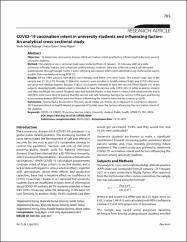| dc.contributor.author | Baybuğa, Media Subaşı | |
| dc.contributor.author | Özkoç, Hatice | |
| dc.contributor.author | Akgün, Şenay | |
| dc.date.accessioned | 2023-07-28T12:38:31Z | |
| dc.date.available | 2023-07-28T12:38:31Z | |
| dc.date.issued | 2023 | en_US |
| dc.identifier.uri | https://www.scopus.com/record/display.uri?eid=2-s2.0-85150596223&origin=resultslist&sort=plf-f&src=s&nlo=&nlr=&nls=&sid=8feecdd7c483d504d5a87c5cf0904ed4&sot=aff&sdt=cl&cluster=scofreetoread%2c%22all%22%2ct&sl=72&s=AF-ID%28%22Alanya+Alaaddin+Keykubat+University%22+60198720%29+AND+SUBJAREA%28MEDI%29&relpos=6&citeCnt=0&searchTerm= | |
| dc.identifier.uri | https://hdl.handle.net/20.500.12868/2304 | |
| dc.identifier.uri | https://jpma.org.pk/index.php/public_html/article/view/6060 | |
| dc.description.abstract | Objective: To determine coronavirus disease-2019 vaccination intent and factors influencing the decision among
university students.
Method: The analytical cross-sectional study was conducted from 25 January - 25 February 2021 at a state
university in Muğla, Turkiye, and comprised undergraduate students. Data was collected using a self-designed
questionnaire through Google Forms. Factors affecting vaccination intent were identified using multinomial logistic
models. Data was analysed using SPSS 22.
Results: Of the 1069 subjects, 629(58.8%) were females and 440(41.2%) were males. The overall mean age of the
sample was 21.34±2.99. Overall, 712(66.6%) students were enrolled in health-related fields, and 357(33.4%) were
pursuing non-medical degrees. Besides, 578(54.1%) students intended to have the vaccine. While 458(64.3%) of the
subjects studying health-related subjects intended to have the vaccine, only 120(33.8%) in other academic streams
said they would get vaccinated. Students who had had the disease or had been in contact with someone who had it
102(33%) were more likely to believe that the vaccine was safe. Smoking, having a flu vaccine in the past, and having
a coronavirus disease-2019 test were the factors influencing the intent to have the vaccination (p<0.05).
Conclusion: Having had a flu vaccine in the past, social media use, history of, or exposure to, coronavirus disease2019 and enrolment in health-related programme of studies were the factors influencing the vaccination intent of
the students | en_US |
| dc.language.iso | eng | en_US |
| dc.relation.isversionof | https://doi.org/10.47391/JPMA.6060 | |
| dc.relation.isversionof | https://doi.org/10.47391/JPMA.6060 | |
| dc.rights | info:eu-repo/semantics/openAccess | en_US |
| dc.subject | COVID-19 | en_US |
| dc.subject | COVID-19 vaccine | en_US |
| dc.subject | Vaccine intent | en_US |
| dc.subject | University student | en_US |
| dc.subject | Public health | en_US |
| dc.title | COVID-19 vaccination intent in university students and influencing factors: An analytical cross-sectional study | en_US |
| dc.type | article | en_US |
| dc.contributor.department | ALKÜ, Fakülteler, Sağlık Bilimleri Fakültesi, Hemşirelik Bölümü | en_US |
| dc.identifier.volume | 73 | en_US |
| dc.identifier.issue | 4 | en_US |
| dc.identifier.startpage | 785 | en_US |
| dc.identifier.endpage | 791 | en_US |
| dc.relation.journal | Journal of Pakistan Medical Association | en_US |
| dc.relation.publicationcategory | Makale - Uluslararası Hakemli Dergi - Kurum Öğretim Elemanı | en_US |


















